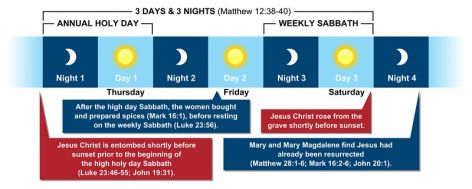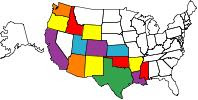For "Scripture Sunday":
Sign of Jonah: Did Jesus Die Good Friday, Rise on Easter?
"Most churches commemorate Jesus’ crucifixion on Good Friday and His resurrection on Easter Sunday. But how does this fit with the sign Christ gave?

Good Friday afternoon to Easter Sunday sunrise does not add up to three days and three nights. This chart shows the chronology of Christ’s crucifixion and resurrection that matches the biblical festivals and confirms the sign of Jonah.
As proof that He was the Messiah, Jesus Christ promised in advance exactly how much time He would spend in the grave. He called it “the sign of the prophet Jonah.”
The sign of Jonah
The religious leaders of Jesus’ day had seen Him work miracles but still didn’t believe He was the Messiah (Matthew 12:23, 38). In fact, the Pharisees plotted “how they might destroy Him” (verse 14) and accused Him of working for Satan (verse 24)!
So when they asked for another sign, Jesus said:
“An evil and adulterous generation seeks after a sign, and no sign will be given to it except the sign of the prophet Jonah. For as Jonah was three days and three nights in the belly of the great fish, so will the Son of Man be three days and three nights in the heart of the earth” (verses 39-40).
Jesus referred to the great miracle from the book of Jonah. God prepared a great fish to swallow Jonah, and Jonah was in the belly of the fish for three days and three nights before God told the fish to spit him out, alive, on the shore. And Christ let everyone know that He would be in the grave for the exact same length of time. He said the sign of Jonah would be the only sign He would give them. This important prophecy was very specific.
How do you get three days and three nights between Friday afternoon and Sunday morning?
Yet today most churches ignore this sign or try to explain that it didn’t really mean three full days and three full nights. Why? Because of a common misunderstanding about the holy times during that week many call Holy Week.
First, try to do the math. Almost all Christian churches teach Jesus Christ died and was buried late Good Friday afternoon, then was raised early Easter Sunday morning. That’s Friday night, Saturday day and Saturday night: two nights and one day. Even if you wanted to stretch things to call the few minutes of daylight on Friday a day, that’s only two days and two nights. Remember, Jesus was already risen before sunrise on Sunday (John 20:1).
Why would Jesus make a point of saying three days and three nights if He didn’t mean it? Is this a contradiction in the Bible or is there a simple explanation everyone would understand if they celebrated the festivals of the Bible as Jesus and His disciples did?
Jesus clearly stated that He and His disciples were celebrating the Passover when He washed their feet and added the New Testament ceremony of the bread and the wine. He said: “With fervent desire I have desired to eat this Passover with you before I suffer” (Luke 22:15).
Jesus and His disciples followed the command found in Leviticus 23 describing the “feasts of the Lord.” “On the fourteenth day of the first month at twilight is the Lord’s Passover” (verses 4-5). Biblical days started in the evening, so after that Passover ceremony, but still on the Passover day, Jesus was arrested, beaten, crucified, killed and buried. In fact, the Jewish leaders were urgent that Jesus’ body not remain on the cross the next day.
“Therefore, because it was the Preparation Day, that the bodies should not remain on the cross on the Sabbath (for that Sabbath was a high day), the Jews asked Pilate that their legs might be broken, and that they might be taken away” (John 19:31).
Most people today would see the word Sabbath and assume this means Saturday, since the regular weekly Sabbath day taught in the Bible is from Friday sunset to Saturday sunset. But most miss the fact that John called it a “high day.” What did he mean? Let’s quickly go back to Leviticus 23. What comes right after the Passover (the 14th)?
“And on the fifteenth day of the same month is the Feast of Unleavened Bread to the LORD; seven days you must eat unleavened bread. On the first day you shall have a holy convocation; you shall do no customary work on it” (Leviticus 23:6-7).
This First Day of Unleavened Bread was an annual Sabbath day—a high day. And it can come on different days of the week.
So the logical explanation is that Christ was exactly right about the three days and three nights. People today are just confused about when He died and was resurrected. It couldn’t have been on a Friday afternoon and Sunday morning.
The accompanying chart shows the math that works—the chronology of Christ’s crucifixion and resurrection that matches the biblical festivals and confirms the sign of Jonah—the only sign Jesus said He would give!" From: “The Sign of Jonah” by Mike Bennett
________
Noah: Skip the movie and read the book!
"The movie Noah, has generated a lot of publicity with its big-name stars, huge budget and controversy over to what extent it sticks to or strays from the biblical story.
I usually really dislike spoilers about movies. But in the case of this film, how do you spoil something that’s already appallingly rotten?
I’d heard and read a number of reviews over recent weeks and was aware of the controversies—that it was so starkly different from the Bible’s story that it’s being marketed with a special disclaimer that it is “inspired by the story of Noah” and its creators “believe that this film is true to the essence, values, and integrity of a story that is a cornerstone of faith for millions of people worldwide.”
I wish either story were close to true. Sadly, both statements are far off the mark.
“Inspired by the story of Noah”? Possibly so, if you think Noah was an ancient environmentalist extremist who abhors other human beings, lives as a recluse browbeating his family into accepting his extremist viewpoints, and whose disgust for the human race leads him to hatch a plan for the death of his entire family—the last human beings left alive on the planet—that includes the murder of his own newborn grandchildren. Somehow I never learned from the Genesis account that Noah was a borderline unhinged murderous psychopath (as this movie portrays him).
“True to the essence, values, and integrity of a story that is a cornerstone of faith for millions of people worldwide”? It takes an advertising budget of millions of dollars to spread a whopper that big. The only thing this movie has in common with the original story is a boat, a lot of water, and some characters’ names. The vast majority of the movie is an enormous perversion of the biblical record. The negative reviews I’d heard and read about how bad the film was didn’t come close to capturing its utter awfulness.
My three-word movie review? WORST.MOVIE.EVER. I couldn’t believe someone could take a straightforward story and distort it so badly.
God’s Word is packed with some of the most amazing and inspiring stories of all time, and it infuriates me that people pervert them like this. And this movie is a perversion on many levels.
God chose to spare Noah because he was a righteous man of faith who “walked with God” (Genesis:6:9; 7:1). He was a “preacher of righteousness” (2 Peter:2:5). He was the recipient of God’s grace because he was “a just man, perfect in his generations” (Genesis:6:8-9). Being “moved with godly fear” to obey God, Noah “became heir of the righteousness which is according to faith” (Hebrews:11:7). He may have spent upwards of 120 years in faithful toil while building the ark (Genesis:6:3).
To see this godly man portrayed in such an appalling way borders on the blasphemous and reveals the deep spiritual sickness in the minds of those who conceived and created this movie.
God’s Word tells us why it records stories such as that of Noah: “These things happened to them as examples and were written down as warnings for us, on whom the fulfillment of the ages has come” (1 Corinthians:10:11, New International Version).
Jesus Christ Himself gives us a glimpse of the world as it will be just prior to His return to earth: “And as it was in the days of Noah, so it will be also in the days of the Son of Man: They ate, they drank, they married wives, they were given in marriage, until the day that Noah entered the ark, and the flood came and destroyed them all…Even so will it be in the day when the Son of Man is revealed” (Luke:17:26-30
).
What He is saying is that in Noah’s day people had grown so accustomed to their hedonistic, self-centered, violent culture that they had simply lost sight of God and how He viewed the world. And like sheep being led to the slaughter, they remained oblivious to the danger until it was too late.
There’s a powerful lesson here for us today. Have we lost sight of God? Do we recognize the gathering storm?
If you want to use your time wisely, skip this movie and read the book—and pray for God’s wisdom to learn from what He inspired to be written there as a lesson for us so many centuries ago!" by Scott Ashley. From: http://www.ucg.org/blog/noah-skip-movie-and-read-book/
_______
Update:
As the pastor and some of the elders of our little church on FM 1097 were attending the church in Cisco TX, The Assembly of Yahweh, http://www.halleluyah.org/ for The Feast of Unleavened Bread, there was no service at our church. So a few of the members, plus Jay, Ray and I went to the afternoon service at the Church of God on FM 830. It was good to see old friends there, and they welcomed us with open arms, and hugs. At the potluck there was no leavening, so no bread or cakes of course, and even matzo with a chocolate and nut spread! Tomorrow, the 21st., is the end of The Feast of The Unleavened Bread, and it is a "High Day".
Next week, I have to see more doctors. An ENT and a lung doctor, and I have to have a cat scan, too. It is difficult to get out of the clutches of Big Medicine! Maybe I will, one day!
 Good Friday afternoon to Easter Sunday sunrise does not add up to three days and three nights. This chart shows the chronology of Christ’s crucifixion and resurrection that matches the biblical festivals and confirms the sign of Jonah.
Good Friday afternoon to Easter Sunday sunrise does not add up to three days and three nights. This chart shows the chronology of Christ’s crucifixion and resurrection that matches the biblical festivals and confirms the sign of Jonah. 













